Hola, amigos de Hive. ¡Hoy celebro! Este primer día de diciembre #Cuba festeja el Día del Locutor. Bueno es que sepas que se escogió esta fecha como acuerdo del II Congreso Interamericano de Locución que se desarrolló en la Habana ese día de 1954 y a uno de sus protagonistas, Jorge Luis Nieto García, insigne locutor avileño.
A lo mejor @yanerkidiaz publique una décima alegórica a la celebración. Por lo general, cada profesión resulta compleja y en cada una hay un principio: servir a los demás. Mientras ideaba este post, pensaba en cómo nació en mí este deseo de ser locutor. Creo que surge a la par que escuchaba la radio. Puedo decir que me atrajo la voz y el estilo de una locutora que admiré tanto, pero tanto, que no perdía ninguno de sus espacios. Partió de esta vida el día de mi cumpleaños. Fue el peor regalo de aquella jornada. Coincidía con una actividad en la que yo estaba participando y que me dedicaban, en la UNEAC.
ENGLISH VERSION (click here!)
Hello Hive friends, today I celebrate! This first day of December #Cuba celebrates the Locutor's Day. It is good for you to know that this date was chosen as an agreement of the II Inter-American Congress of Broadcasting that took place in Havana that day in 1954 and one of its protagonists, Jorge Luis Nieto García, distinguished broadcaster from Avileña.
Maybe @yanerkidiaz will publish a tenth allegorical to the celebration. In general, every profession is complex and in each one there is a principle: to serve others. As I was thinking about this post, I was thinking about how this desire to be a broadcaster was born in me. I think it arose at the same time I was listening to the radio. I can say that I was attracted by the voice and style of an announcer that I admired so much, but so much, that I did not miss any of her programs. She departed this life on my birthday. It was the worst gift of that day. It coincided with an activity in which I was participating and which was dedicated to me at the UNEAC.
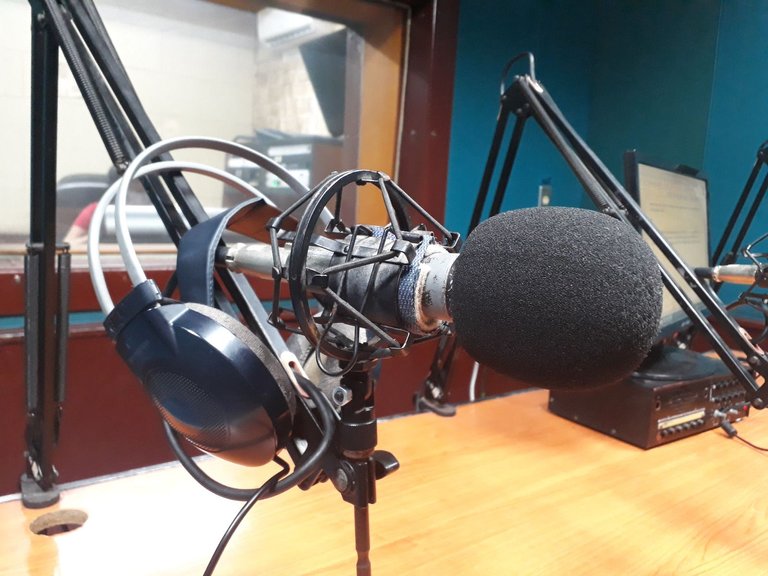
En la emisora de mi provincia hubo un programa que se llamaba Toque Joven. Ya yo había comenzado como escritor, y me gustaba “hablar por la radio”. Fue entonces que me interesé por formar parte de aquel espacio juvenil que tenía una locutora y un conjunto de colaboradores que ejercían la función de “hablantes”. Todos tenían como propósito algún día ser locutores. La directora (a quien quiero mucho) era muy exigente en cuanto a la disciplina y el rigor. Tenías que expresarte bien ante el micrófono. De lo contario, te sentaba en el banco hasta pasar un tiempo. Ahí tuve mis primeros acercamientos a la locución. Ese arte de hablarles a miles de personas desde un micrófono, es mágico.
Puedo decirte que comencé a ganar protagonismo en aquel programa. Descubrí que la animación y el ser jocoso me hizo ganar un espacio entre los oyentes. Hacía secciones que atraían público. Era Toque Joven un proyecto atrevido, hecho por y para jóvenes. Estar ahí no te hacía “locutor” profesional. Para ello había que pasar un curso de habilitación. Siempre hice radio como colaborador, en programas que ya tenían su locutor. Esperé 7 años un curso hasta que me enteré de una convocatoria. Adivina dónde. En la televisión. El único curso que se ofreció en la provincia era para trabajar en la TV. Confieso que este medio no me atrae tanto, pero por tal de ser locutor, había que asumir el reto.
ENGLISH VERSION (click here!)
In the radio station of my province there was a program called Toque Joven. I had already started as a writer, and I liked "talking on the radio". It was then that I became interested in being part of that youth program that had a female announcer and a group of collaborators who acted as "talkers". All of them had the purpose of one day becoming announcers. The director (whom I love very much) was very demanding in terms of discipline and rigor. You had to express yourself well in front of the microphone. Otherwise, she would sit you on the bench for a while. That's where I had my first approach to voice-over. That art of speaking to thousands of people from a microphone is magical.
I can tell you that I began to gain prominence in that program. I discovered that animation and being humorous made me gain a space among the listeners. I did sections that attracted audiences. Toque Joven was a daring project, made by and for young people. Being there did not make you a professional "announcer". For that you had to pass a qualification course. I always worked on the radio as a collaborator, in programs that already had an announcer. I waited 7 years for a course until I heard about a call. Guess where? On television. The only course offered in the province was to work in TV. I confess that I was not that attracted to this medium, but as long as I wanted to be an announcer, I had to take on the challenge.
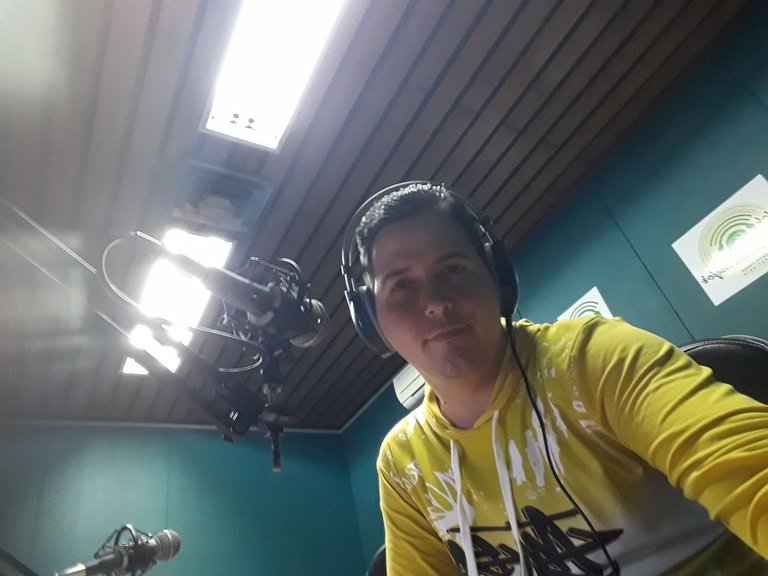
Lo primero fue enfrentar una especie de casting para poder entrar al curso. Tuve que pararme en un estudio de TV inmenso, donde solo había un podio, la cámara del plató y yo. Había que leer una noticia con la técnica televisiva, algo que yo no dominaba, porque estaba adaptado a leer en radio. En la televisión este ejercicio se hace leyendo por el papel un grupo fónico (conjunto de palabras), mirar rápidamente las que vienen, memorizar la expresión, mirar a la cámara y decir toda la expresión. Y así sucesivamente. Temblaba en aquella prueba, pero no tuve equivocación alguna. Aprobé para entrar al curso.
Las clases que recibía, los módulos, ibas desde: Actuación para la cámara, Técnicas de Locución, Lingüística Aplicada, Inglés, Geografía, Cultura General, entre otras. Tres años duró aquel curso. Tuvimos profesores muy exigentes, al extremo, pero eso nos ayudó a emprender. Recuerdo una profesora que me decía: -“Tú no puedes ser locutor. Tienes un problema con tus dientes que impide la articulación de determinados sonidos”. Eso me afligía tanto. Pero luchaba por tratar de continuar.
ENGLISH VERSION (click here!)
The first thing was to face a kind of casting to enter the course. I had to stand in a huge TV studio, where there was only a podium, the camera on the set and me. I had to read a news item with the television technique, something that I did not master, because I was adapted to reading on the radio. In television, this exercise is done by reading a phonic group (set of words) on paper, quickly look at the words that come, memorize the expression, look at the camera and say the whole expression. And so on. I was trembling in that test, but I made no mistake. I passed to enter the course.
The classes I received, the modules, ranged from: Acting for the camera, Voiceover Techniques, Applied Linguistics, English, Geography, General Culture, among others. That course lasted three years. We had very demanding teachers, to the extreme, but that helped us to undertake. I remember a teacher telling me: "You can't be a speaker. You have a problem with your teeth that prevents you from articulating certain sounds. That distressed me so much. But I struggled to try to continue.
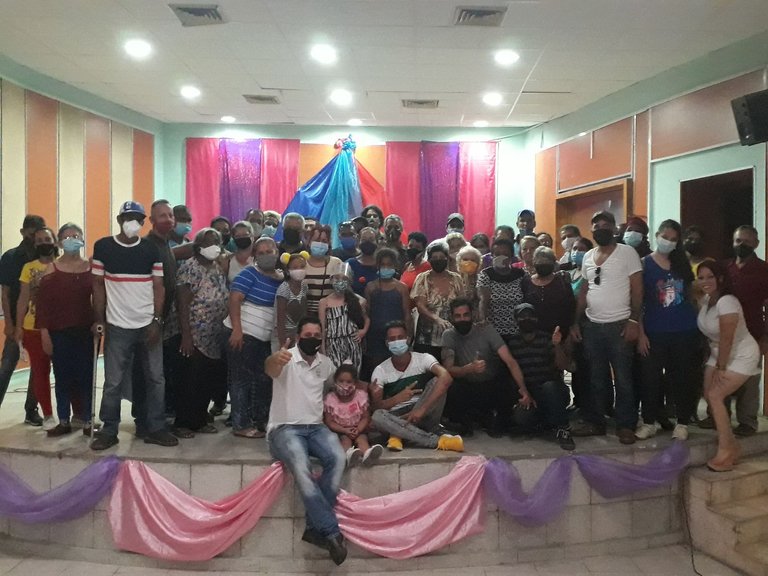
Recuerdo que a veces nos ponían a practicar en el patio del telecentro, había que presentar un programa cultural. Varios directores se paraban a vernos para “cazar” sus futuros locutores. Cuando me tocó a mí, una veterana directora me dijo: -Todavía tienes que sacarte la radio de adentro, un locutor de TV no habla así. No sé aún a qué se refería. Con el paso del tiempo, al final, nos graduamos, de 30 estudiantes, solo 6, que hoy nos mantenemos activos en los medios. Una compañera y yo volvimos a la radio.
Valoro mucho a los locutores de televisión. Por lo menos en Cuba deben ser adictos a cuidar su físico, a comprarse determinadas ropas costosas, porque a la TV no puedes ir con cualquier tipo de tela. Asimismo, las posiciones al sentarte, que si las manos, que si el maquillaje, que si la sonrisa previa antes de que te ponchen la cámara y mantenerla hasta que tu cara ya no esté en pantalla. Uff, cantidad de requisitos y después de todo ello, lo que dices y cómo hacerlo.
Yo enseguida me fui a mi charca, la radio. He tenido la posibilidad de hacer televisión, pero te confieso que sentarme frente a este micrófono, yo solito, y hablar de manera confidente, alegre, me ha hecho obtener muchos amigos oyentes. Enseguida la radio nos ofreció trabajo y aun siendo locutores profesionales, seguíamos en el proyecto juvenil. Poco a poco fuimos teniendo nuestros propios programas, algunos de madrugada, que tanto te exigen. Fui haciendo revistas variadas y musicales. Sentía que ganaba un espacio en el corazón de la audiencia, pues me llamaban para felicitarme, preguntar por mí, esperarme a las afueras de la emisora para conocerme, buscarme en las redes sociales. Era y es muy bonito sentir eso.
ENGLISH VERSION (click here!)
I remember that sometimes they would put us to practice in the courtyard of the telecenter, we had to present a cultural program. Several directors would stop to see us to "hunt" their future announcers. When it was my turn, a veteran director told me: -You still have to get the radio out of your head, a TV announcer doesn't talk like that. I still don't know what she meant. As time went by, in the end, we graduated, out of 30 students, only 6, who today are still active in the media. A classmate and I went back to radio.
I value television announcers very much. At least in Cuba they must be addicted to taking care of their physique, to buying certain expensive clothes, because you can't go on TV with just any kind of fabric. Likewise, the sitting positions, the hands, the make-up, the smile before the camera is turned on and to keep it until your face is no longer on the screen. Uff, a lot of requirements and after all that, what you say and how to do it.
I immediately went to my pond, the radio. I had the chance to do television, but I confess that sitting in front of this microphone, by myself, and talking in a confident, cheerful way, has made me get many friends listeners. Immediately the radio offered us work and even though we were professional broadcasters, we continued with the youth project. Little by little we had our own programs, some of them in the early hours of the morning, which are so demanding. I was doing varied and musical magazines. I felt that I was gaining a space in the hearts of the audience, because they called me to congratulate me, ask for me, wait for me outside the station to meet me, look for me on social networks. It was and is very nice to feel that.
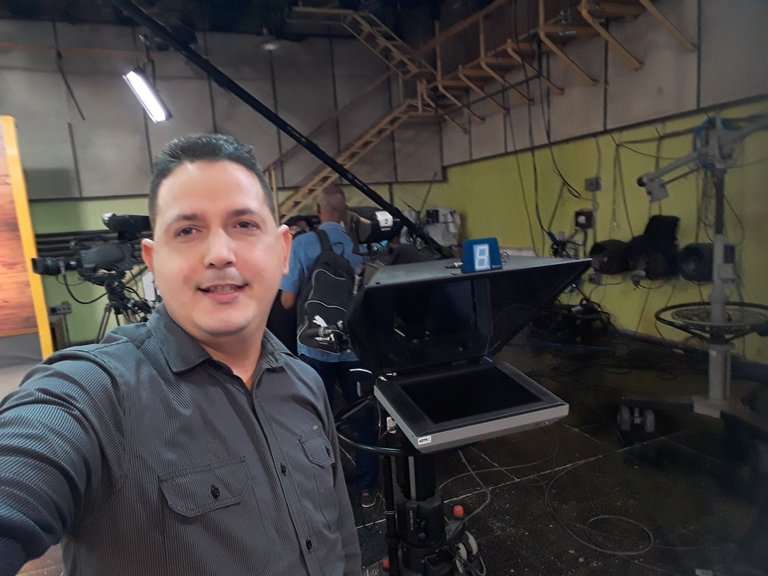
La radio hacía investigaciones sociales y en los resultados, los encuestados elogiaban mucho mi trabajo. Dos veces fui seleccionado como Locutor Popular. Eso me impresionaba mucho, pues mis colegas son muy buenos profesionales. Ese era el aplauso del público. A los dos años, me enfrenté a algo que me impactó muchísimo: la nivelación. Te explico. La locución cubana tiene su propia escuela. Esto es, hay una serie de requisitos indispensables para evaluar a los locutores. Se avanza desde el tercer nivel hasta el primero. En todo ello va la experiencia adquirida y las condiciones físicas. La primera vez que me enfrenté a este examen, en el que se decide si sigues o te vas, lo hice frente a tres grandes locutores, muy reconocidos, de la radio cubana.
Lo primero es que te hacen un examen de cultura general donde lo mismo te preguntan por el cargo de algún político, las pirámides, el título del último disco de una agrupación, que 6 efemérides del mes, los epítetos de cantantes. Cualquier cosa. En un mundo cultural tan inmenso, poder contestar estas interrogantes supone un estrés. Recuerdo que esa parte la hice muy bien. Luego tuve que leer distintos tipo de textos y marcar entre ellos la diferencia.
ENGLISH VERSION (click here!)
The radio station did social research and in the results, the respondents praised my work highly. Twice I was selected as Popular Announcer. That impressed me a lot, because my colleagues are very good professionals. That was the public's applause. Two years later, I was confronted with something that had a great impact on me: leveling. Let me explain. Cuban speech has its own school. That is, there are a series of indispensable requirements to evaluate the speakers. They advance from the third level to the first. In all this goes the experience acquired and the physical conditions. The first time I faced this exam, which decides whether you continue or leave, I did it in front of three great, very well known Cuban radio broadcasters.
The first thing is that they give you a general culture test where they ask you about the position of a politician, the pyramids, the title of the last album of a group, 6 ephemeris of the month, the epithets of singers. Just about anything. In such an immense cultural world, to be able to answer these questions is a stress. I remember that part I did very well. Then I had to read different types of texts and make the difference between them.
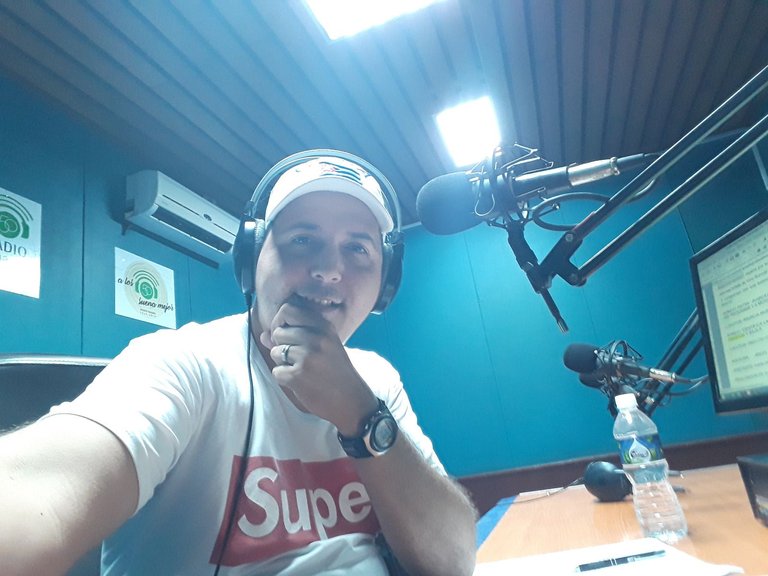
Nunca un locutor sin nivel alcanza el primero en ese primero intento, pero sí puedes lograr pasarte el tercero y obtener el segundo. Ese era mi deseo, la aspiración de todos allí. Al concluir me felicitaron y me dijeron que saliera. Sentí cómo me quitaba un peso de encima. Era un examen para el cual llevaba un año preparándome, junto a mis compañeros. Luego nos iban diciendo en qué nivel estabas. Cuando me hicieron pasar, me elogiaron mucho, no lo olvido. “-Tienes una cultura general como pocos locutores y eso te ayudará mucho”- me decían. “-Improvisaste muy bien, el ritmo, el tono, la voz, todo bien, pero hay un problemita ahí con la erre. Por eso, te otorgamos el tercer nivel”.
Está bien, lo acepté, a fin de cuentas, estaba empezando. Eso fue por el 2018. Nunca cejé en mi deseo de ser un locutor carismático, agradable al oyente, amigable, respetuoso. Lo otro es que esos locutores no conocían mi trabajo. Puedes ser un comunicador excelente 364 días al año. Si un día no lo hiciste bien, por ese se miden todos. En el año 2022 me sometí a otra nivelación, dos semanas antes de defender mi doctorado, hice un examen parecido al anterior frente a locutores de mi provincia y me notifican esta vez que debo ver a un foniatra, que mi aparato fonoarticulatorio no está bien, que me permiten continuar en el tercer nivel, pues saben que la audiencia me valora, la creatividad, y todo lo demás. Confieso que fui a ver a un foniatra, luego a otro y ambos coincidieron en que no había problema de foniatría alguno. ¡No era tampoco mi momento! Tenía que alejar la depresión que suponía aquella decisión, pues estaba a 2 semanas de defender una tesis en la Habana.
¿Cómo es posible que para ser un “buen locutor” importe más pronunciar cada fonema bien? ¡Nadie habla así en mi comunidad lingüística! ¿Cómo es posible que un oyente se identifique contigo como artista si al hablar no lo haces como él? ¿Cómo es posible que no importe que tus programas sean los que más se escuchen, que seas el locutor que atrae tanta audiencia? ¿Acaso eso no importa? Estas preguntas nunca me abandonarán. Es increíble ver cómo hay locutores que se expresan con cada erre y ese, pero que no atraen audiencia. –Esto me lo decían algunos directores y me hicieron abrir los ojos.
ENGLISH VERSION (click here!)
Never a speaker without a level reaches the first one in that first attempt, but you can manage to pass the third one and get the second one. That was my wish, the aspiration of everyone there. At the end they congratulated me and told me to go out. I felt a weight lifted off my shoulders. It was an exam for which I had been preparing for a year, together with my classmates. Then they would tell us what level you were at. When they made me pass, they praised me a lot, I don't forget it. "You have a general culture like few speakers and that will help you a lot," they told me. You improvised very well, the rhythm, the tone, the voice, everything was fine, but there is a little problem there with the "erre". That's why we give you the third level".
Okay, I accepted it, after all, I was just starting out. That was around 2018. I never wavered in my desire to be a charismatic, listener-friendly, friendly, respectful broadcaster. The other thing is that those broadcasters didn't know my work. You can be an excellent communicator 364 days a year. If one day you didn't do well, that's what they're all measured by. In the year 2022 I underwent another leveling, two weeks before defending my doctorate, I took an exam similar to the previous one in front of broadcasters in my province and this time they notified me that I should see a phoniatrist, that my phonoarticulatory apparatus is not well, that they allow me to continue in the third level, because they know that the audience values me, creativity, and everything else. I confess that I went to see a speech therapist, then another one, and both agreed that there was no phoniatric problem. It was not my time either! I had to get away from the depression that this decision meant, as I was 2 weeks away from defending a thesis in Havana.
How is it possible that to be a "good speaker" it matters more to pronounce each phoneme well? Nobody speaks like that in my linguistic community! How is it possible that a listener identifies with you as an artist if you do not speak like him? How is it possible that it does not matter that your programs are the most listened to, that you are the speaker that attracts so much audience? Does it not matter? These questions will never leave me. It is incredible to see how there are broadcasters who express themselves with every "erre" and "ese", but who do not attract an audience. -This was said to me by some directors and it made me open my eyes.
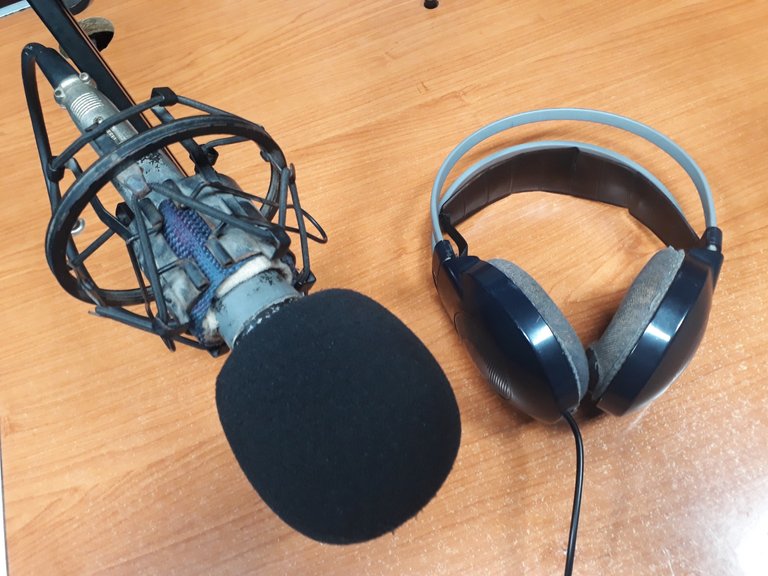
A esto se debe que muchos espacios de la televisión cubana prefieran tener a un actor o actriz conduciendo un programa, por su carisma, que a un locutor de este tipo tan cuadrado. Nadie es perfecto. Cada artista tiene su virtud. Luego entendí, como me decían colegas experimentados, que un nivel no importa y lo aprendí muy bien. Aprendí que es una profesión que se disfruta, no se puede sufrir con ella. El público te dirá si eres lo que buscan o no. Te llamarán por teléfono, te buscarán, hablarán de ti, llamarán mucho a tus programas. Ese es el premio. Y es verdad.
Hoy celebro tanto este día. Ha sido mi carrera más “fuerte”, por la que he luchado hasta deprimirme, fascinarme, enorgullecerme. Felicito a mis colegas, a esos locutores cubanos que sí le llegan a un pueblo trabajador, humilde, capaz de valorar. Cuando escuches o veas un locutor, piensa en todo lo que estuvo dispuesto a hacer por estar ahí. Es una profesión dura, por la que hay que sacrificar casi todo. Pero es hermoso tocar el corazón con solo decir: -Gracias por tu sintonía, amiga o amigo oyente.
Las imágenes utilizadas en la publicación fueron tomadas con mi móvil Samsung Galaxy J7 Prime. Textos llevados al Inglés por Deepl Traslate.
ENGLISH VERSION (click here!)
This is the reason why many Cuban television programs prefer to have an actor or actress hosting a program, because of his or her charisma, rather than an announcer of this very square type. Nobody is perfect. Every artist has his virtue. Then I understood, as experienced colleagues told me, that a level does not matter and I learned it very well. I learned that it's a profession that you enjoy, you can't suffer with it. The public will tell you if you are what they are looking for or not. They will call you on the phone, they will look for you, they will talk about you, they will call your programs a lot. That's the prize. And it's true.
I celebrate this day so much today. It has been my "strongest" career, the one I have fought for until I was depressed, fascinated, proud. I congratulate my colleagues, those Cuban broadcasters who do reach a hard-working, humble people, capable of valuing. When you hear or see a broadcaster, think of everything he was willing to do to be there. It is a hard profession, for which you have to sacrifice almost everything. But it is beautiful to touch the heart just by saying: -Thank you for tuning in, listener friend.
The images used in the publication were taken with my Samsung Galaxy J7 Prime cell phone. Texts translated into English by Deepl Translate.
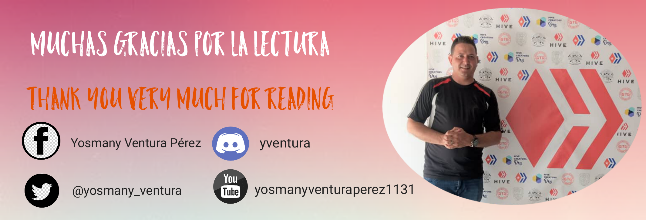


Mis felicitaciones para usted mi estimado @yventura por el loable trabajo que realiza en esta otra profesión y el amor y respeto que pone en todo lo que hace. Es un privilegio contar con su persona y poder beber de todo su trabajo. Lindo día. Feliz fin de semana. Salud y saludos.
Muchas gracias por esa felicitación, mi amigo.
Muy merecidas por todo lo que haces en función de la radio. Feliz fin de semana. Salud y saludos.
Muchas felicidades por tu día del locutor y por tu lindo post.
Hermoso tu comentario, mi amiga. Muchas gracias por tus elogios.
Muchas felicidades amigos en esta jornada por el día del locutor, la felicitación es doble por el esfuerzo, amor y dedicación que le pones a esta bonita profesión, un saludo y gracias por compartir este bonito post, es una pena que la locutora que tanto admiraba falleciera el mismo día de tu cumple, imagino que eso lo recordarás siempre. Un saludo para ti y feliz día.
Gracias, Mariolis, por ese mensaje tan hermoso. Significa mucho este día.
Qué bonito post. Cada experiencia de vida que cuentas hace que admire más al profesional que tengo el placer de disfrutar en varios espacios académicos y en la radio. Allí nos haces sentir en casa. No necesitas pronunciar con excelencia la r cuando la ponderas en respeto, responsabilidad, rigor, resiliencia.
De la décima, esto aquí ya se lo dije a @nanixxx , voy a poner una escribanía para la producción de décimas por encargo, pero con sentimiento.
La medida de un suspiro
llamaré mi escribanía
para llevar la alegría
con este verso que admiro.
Citadino o muy guajiro,
con versos de guayabera ,
encontraré la manera
de alegrar el corazón
con poética razón
de todo el que así lo quiera.
Pero sin dudas los locutores cubanos y en especial @raima y @yventura merecen una décima especial. Felicidades.
🤭😅🤣
Muchas gracias, amiga mía. Te quiero tanto. Te aprecio y admiro.
Súper 😀 muy linda décima 👏👏🤗
Felicidades, locutor, muy significativa tu trayectoria. Saludos.
Gracias, amigo mío, le envío un abrazo fuerte.
¡Intimidante! 😜
Felicidades amigo, te mando un abrazo y no abandones la charca, se te da bien. Felicitaciones también para @raima y por supuesto mis cariños.
Te quiero tanto. Eres de esos regalos de Hive jjjjj. Muchas gracias, amiga.
Felicidades a todos los locutores. Saludos🤝
Muchas gracias, mi amigo
¡Muchas felicidades! Muy lindo post, siga así que lo que vale es la opinión del público. Saludos🤗
Muchas gracias, @mayramalu. Tiene mucha razón en lo que dice.
Felicidades hermano. Ustedes hacen arte . Sigan regalando su talento. Un abrazo.
Gracias, Robe. Se te aprecia, hermano.
Muchas felicidades 🥳. Muy linda tu historia en la radio. Eres uno de los locutores que harán historia en el medio, creeme que has aportado mucho. Espero que sigas regalando con tu voz y tu entrega toda la creatividad que te caracteriza. Muchas felicidades a tu esposa también. Tiene una bella voz y dicción. Un abrazo grande para los dos.
Muchas gracias, @moraleskatia. He sabido apreciar el arte también gracias a ti.
Gracias 😊
Muchas felicidades mi amigo, por este noble trabajo que realizan con mucha dedicación para su radioescuchas. Confieso que es un trabajo que exige una alta cuota de amor a lo que hacen, se agradece todo ese esfuerzo que realizan por mantener informado así como entretenidos a mayores y chicos.
Gracias, @eduardo900613, por el apoyo siempre.
Post manually reviewed. 😊
Thanks!!!!!
Yay! 🤗
Your content has been boosted with Ecency Points, by @eduardo900613.
Use Ecency daily to boost your growth on platform!
Support Ecency
Vote for new Proposal
Delegate HP and earn more
Thanks!!!